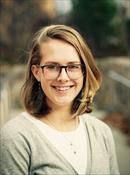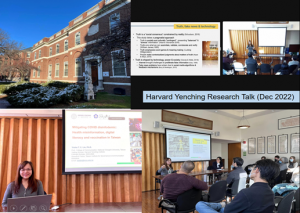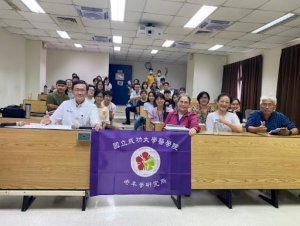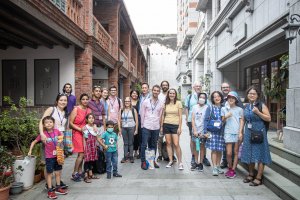It is not an easy task to think back to a time before Taipei was home. Over the past two years, Fulbright Taiwan and National Chengchi University have given me the platform to build my understanding of Taiwan inside and outside of the classroom and fueled my cross-cultural understanding.
When I came to Taiwan in September 2016, armed with google maps and no ability to speak Chinese, I began my degree in International Studies at NCCU; I got my student card, and I was off. In just my first month in Taiwan, I invested my time in four classes, joined two student clubs, hiked Hehuan mountain and attended a wedding. Jam packed and unpredictable, that month was very indicative of my first year in Taiwan.
Primarily, my studies have occupied most of my time and fascination. My courses ranged from International Relations and Political Philosophy to Human Rights, Humanitarian and State Sovereignty with some fundamental International Relations Theory in the middle. The classes offered at NCCU from a diverse faculty exposed me to a new way of thinking about world politics and how countries relate to one another. Learning in our microcosm of a classroom, with students coming from across the globe was an indescribably valuable way to enrich my understanding of other’s perspectives. And what better location to study world politics than in one of the most politicized places of the world.
Just as the year began to roll, Fulbright Taiwan celebrated our arrival with the FSE welcome dinner—an amazing opportunity to meet all the Fulbrighters in Taiwan as well as the Master’s Degree students that were in a year ahead in our two-year program. This night sticks in my mind as one of the first times feeling at home. I cherish the experiences of those who come before me and pave the way as such bright resources of information. Hearing the research projects of the many scholars develop over the year, from introductory research explanations to final end of the year summaries, I am lucky to have been exposed to such fascinating research.
Beyond the classroom, Taiwan has taught me so much. Being such an easy place to live, Taipei can often make you forget about your surroundings. For my winter break from school, I decided to travel to India with American friends studying in Beijing. Our experiences in India naturally brought us to compare with our “home” experiences of Taiwan and Beijing and we repeatedly found the differences stark. They brought air masks; I brought pineapple cakes. In many ways, Beijing had prepared them for the dusty harsh climate of New Delhi but left me missing home. There is nothing like being away from home that makes you miss the little things. Coming back to Taipei, I realized how much I appreciated the safety, the friendliness of people, and the ease of traveling around the country. In many ways, Taiwan so easily became my home, I often forget to appreciate it. Of course, India was beautiful, but the opportunity to call Taiwan my home is something I won’t ever take for granted again.
In the spring, I had two close friends from the US come to visit me. Showing them around, taking day trips out of the city, and making sure to go up in Taipei 101 made me feel like a tour guide in my own home town. I wanted them to love Taiwan as much as I do, and they did.
When school started up again in the fall, I focused in on making my thesis topic a reality. In 2015, a Cornell research trip to Vietnam to study labor rights and working conditions spurred my interest in the effects of international businesses on developing country’s working standards. I decided to dive specifically into Taiwan’s impact in Vietnam as I felt my prior experiences converge on this topic. I was able to connect with some amazing researchers in this field and began my thesis work. Now as I wrap up my researching and my thesis, I was able to visit and experience Vietnam again, but this time as a whole new person. Fueled with my year of research, I was much better prepared to apply what I had learned into making useful and relevant interviews.
Being in Taiwan with the freedom to study many sensitive issues, I’ve been able to dive into one of my strongest passions: researching and advocating for fair workplace practices and sustainable labor-rights. I feel lucky to have been able to combine my passions and prior experience in Vietnam with my research in Taiwan—especially as some of the top researchers on this topic reside here in Taiwan’s best universities. I’ve been able to work on the research that I love and organize it using theories I’ve learned in my courses at school.
I can’t help but compare my first experience researching in Vietnam in 2015 with my most recent trip to do interviews in the spring of 2018. Prepared with expectations from my first research trip, I found my second trip to be surprisingly smooth. The interviews I scheduled flowed much easier, the questions better resulted in the types of answers I sought, the data I gathered fit much better into my understanding of Vietnam. Reflecting on how that experience was so different from my expectations, writer Anaïs Nin’s words come to mind, “We do not see things as they are, we see them as we are.” It was so clear that being in Taiwan and researching had changed and prepared me to better understand the world.
I often say, “everything is relative” and what I mean is that we get value out of experiences by comparing them with other events, whether those events are in the past or they are the experiences of others. I naturally compare my thoughts about Taiwan now with when I first arrived. I use the experiences of others that come before me to make sense of my own. Through my observations, I can witness my own change over time. I know, not only is the way I see Taiwan different, but I am also different because of Taiwan. Senator Fulbright was wise to prescribe knowledge to bridge cultures, and I believe my experience is evidence of this truth.
Thank you to all the spectacular friends from all over the world that I have made this year and to National Chengchi University for hosting me. Thank you to my Taiwanese friends and family that have made Taiwan home. But most of all, an enormous thank you to Fulbright Taiwan for making this experience possible.
Managing editor: Yung-Chen Hung 洪永城







